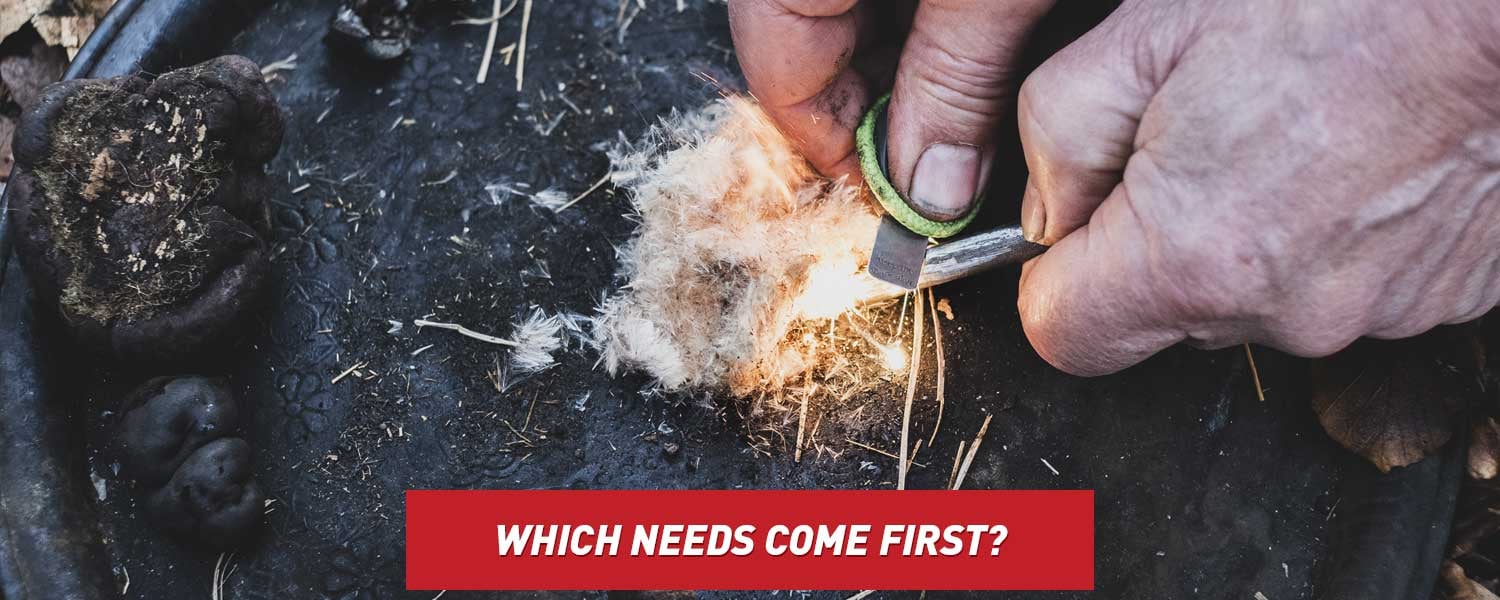WHICH NEEDS COME FIRST?
APPLYING MASLOW'S WORK TO OUR
PREPAREDNESS JOURNEYS
 Today, I want to discuss something that's been kicking around my mind for a while. I was reflecting on a psychology concept known as Maslow's Hierarchy. You familiar with it?
Today, I want to discuss something that's been kicking around my mind for a while. I was reflecting on a psychology concept known as Maslow's Hierarchy. You familiar with it?
Well, I thought I'd share my thoughts on this concept from a preparedness perspective. What it teaches us we can all use to get better prepared.
To give everyone a basic background, Abraham Maslow proposed his hierarchy of needs in a 1943 paper titled "A Theory of Human Motivation."
Since then, this hierarchy of needs is often illustrated as a pyramid. If our needs are not met in the bottom floors of the pyramid, the ones above it cannot be satisfied. It's a pretty simple concept.

When it comes to survival, we mostly focus on the two bottom levels of the pyramid - physiological needs and needs for safety. However, if we can satisfy higher levels of the pyramid in a survival situation, we'll be much better off. More on that a bit later.
For now, let's focus on how to interpret Maslow's requirements to satisfy our physiological needs and needs for safety.
Physiological
The human body needs air, water and food to function properly. These are our most obvious physiological needs.
However, Maslow also includes clothing and shelter as necessary physiological needs to provide protection from the elements.
Here's where I disagree with Maslow. I think these should be considered separate needs and here's why:
Without a functioning human body (supplied with air, water, and food), the shelter does not help you.
In fact, it's nearly impossible to find (or build) adequate shelter if you are delirious from dehydration or starvation.
That's why we work so hard to develop and sell the best food and water survival solutions available. We could spend money bringing cool survival shelters to market, but we feel that would be getting away from what we deem so important to survival.
That's why we suggest everyone take care of these:
In your home:
- An off-grid water filtration system like our Alexapure Pro
- Enough food to feed each family member for at least 3 months
In your car:
- A portable filtration solution like our Survival Spring or Alexapure Go
- Enough food for at least 72 hours per passenger
In your go-bag:
- A lightweight, portable filter like our Survival Spring
- Enough food to get to your "bug-out" location per family member (this varies widely)
Once you take care of these, you can be confident you will be able to take care of your physiological needs in a crisis.
On to the next need on Maslow's hierarchy:
Safety
To briefly cover safety needs, this includes things like:
- Personal security
- Financial security
- Health and well-being
- Safety net against accidents/illness and their adverse impacts
What I find interesting about these needs is that all of them can be met in some way with a responsible level of preparedness.
 Storing emergency food can help you feel financially secure, even if you're not totally feeling secure in your job, for example.
Storing emergency food can help you feel financially secure, even if you're not totally feeling secure in your job, for example.
And just like insurance protects your home or vehicle, having water filtration systems in place helps protect your health and safety if a contamination issue occurs and you are late to be notified.
Just a few quick examples, but you might see where I'm going here.
Having preparedness supplies and a plan in place makes it so much easier to keep your human needs for safety met, even in the worst conditions. It's truly the basis of what is commonly referred to as "peace of mind."
So, know that preparedness instantly helps you cover the most basic levels of human needs - especially when you need them most in a crisis.
So, what about the other levels?
Well, joining friends, family and neighbors in preparedness can help you with a need for belonging, which is the next level up in the hierarchy.
I'm sure we can all draw parallels to why we prepare and the higher-level orders of need, but those higher levels are often deeply personal so I won't go into them here.
I want to close by saying that, while obviously, I'm not a trained psychologist by any means, I wanted to share my thoughts on the concept from my perspective on preparedness.
I hope you found this insightful and might apply this thinking to your own preparedness journey.

In Liberty,
Grant Miller, Preparedness Advisor


